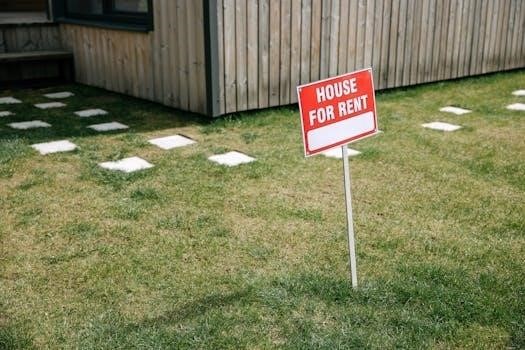Understanding the BC Rental Application Process
The BC rental application process involves several key steps, including submitting a detailed application form and providing consent for background checks․ Landlords use these applications to screen potential tenants, verifying their credit, rental history, and sometimes criminal records․ This process helps ensure a suitable tenant for the property․
The Importance of Tenant Screening
Tenant screening is a crucial step for landlords in British Columbia, helping them make informed decisions about prospective renters․ It minimizes the risk of renting to individuals who might cause property damage, fail to pay rent on time, or engage in disruptive behavior․ A thorough screening process includes a review of the rental application, credit checks, and background checks․ This provides landlords with a comprehensive picture of an applicant’s financial responsibility and past rental history․ By identifying potential red flags early on, landlords can protect their investment and ensure a smoother tenancy․ Screening also promotes a fair and transparent process, giving landlords confidence in their decisions․ Furthermore, in today’s competitive rental market, effective tenant screening is invaluable for maintaining a secure and stable rental property․ Landlords should also be aware of and adhere to all legal regulations when screening, which would include getting written permission before initiating a background check․ Utilizing online platforms can simplify this process for both landlords and prospective tenants․
Components of a Rental Background Check
A rental background check in British Columbia typically includes several key components designed to provide landlords with a comprehensive view of a prospective tenant․ Firstly, a credit check is essential, revealing the applicant’s credit score, open credit lines, and history of bankruptcies or collections․ This helps landlords assess the applicant’s financial responsibility․ Secondly, a criminal background check is often included, which searches for past criminal activity and may include sex offender registries․ This helps to ensure the safety and security of the property and other tenants․ Another critical element is the review of rental history, looking into previous addresses and landlord references to verify past tenancy behavior․ Eviction history is also a standard part of background checks to identify applicants with past eviction records․ Finally, some checks may include income verification to confirm the applicant has the financial means to meet rental obligations․ These components collectively provide a detailed picture to aid landlords in making informed decisions․

Tenant Consent for Background Checks
In British Columbia, obtaining explicit tenant consent is a crucial legal requirement before conducting any background checks․ Landlords must secure written permission from prospective tenants before initiating credit checks, criminal record searches, or contacting previous landlords․ This consent is typically included as part of the rental application form or as a separate document, outlining the specific types of checks that will be performed․ The Fair Credit Reporting Act, although not specifically Canadian, underscores the importance of permissible purposes for accessing personal information, including housing applications․ Landlords are not permitted to access an applicant’s personal details without their express authorization․ This requirement ensures transparency and safeguards the privacy rights of tenants․ It also allows tenants to understand what information will be collected and how it will be used to make a decision․ The lack of informed consent can lead to legal repercussions for landlords․ Therefore, obtaining explicit written consent before running any background checks is an essential part of the rental process․
Cost of Rental Applications and Background Checks
In British Columbia, landlords are generally not permitted to charge tenants a fee for the rental application itself․ However, when it comes to background checks, the costs are typically borne by the applicant․ These costs can vary depending on the specific screening services used, often encompassing credit checks, criminal record searches, and sometimes eviction history reports․ Typically, third-party screening services are employed, and the associated fees are charged directly to the prospective tenant․ Some platforms may offer packages that include various types of checks, affecting the overall cost․ It’s important for landlords to choose reputable services that adhere to privacy regulations while providing reliable information․ While the landlord might not directly charge for the application, they often utilize tenant screening services that have fees for the reports․ These fees are often seen as a necessary expense for landlords to mitigate the risk of renting to unsuitable tenants․ These costs should be clearly communicated to the prospective renter․ Transparency regarding fees helps tenants make informed decisions before applying․
Zillow Rental Manager and Tenant Screening
Zillow Rental Manager offers a comprehensive suite of tools to streamline the tenant screening process for landlords in British Columbia and elsewhere․ Landlords can easily send rental applications to prospective tenants online, and Zillow integrates with third-party services to conduct thorough background checks․ These checks typically include credit reports, criminal background checks, and eviction history․ Zillow provides landlords with access to this information, enabling them to make more informed decisions when selecting tenants․ This platform simplifies the process by allowing tenants to complete the application and consent to background checks online․ For landlords, Zillow Rental Manager gathers all vital information in one place, such as the renter’s income documents and credit history, making tenant selection more efficient․ Zillow also ensures that landlords and tenants have the needed information to help verify an applicant’s eligibility․ The cost for these tenant screening reports is often paid by the applicant and allows them to apply to multiple listings within a 30-day period․ The platform is user-friendly and offers quick turnaround times for background check results․
Online Rental Application Platforms
Several online platforms facilitate the rental application process, offering streamlined solutions for both landlords and tenants in British Columbia․ These platforms allow applicants to complete and submit rental applications digitally, often including consent for background checks within the form itself․ Many platforms partner with credit bureaus and background check services to provide comprehensive reports to landlords․ These reports can include credit scores, criminal history, and eviction records, aiding landlords in making informed decisions․ Online platforms offer benefits such as faster processing times compared to traditional paper applications and allow landlords to share application requests and receive tenant information quickly․ Some platforms also provide tools for landlords to manage multiple applications and communicate with prospective tenants․ These online systems simplify the application process, enhancing efficiency and convenience․ They often provide secure portals for both landlords and tenants, ensuring that sensitive information is protected throughout the application and screening process․ By moving to digital applications, these platforms reduce paperwork and help to organize important tenant information․
Information Included in a Rental Application
A standard rental application in British Columbia typically requests a range of personal and financial information from prospective tenants․ This includes full name, date of birth, current address, and contact details․ Applicants are usually asked to provide their social security number, which is essential for conducting credit and background checks․ Employment history, including current and previous employers, positions held, and income details, is also required to assess financial stability․ Landlords often request references from previous landlords to gain insight into the applicant’s rental history and behavior․ The application usually includes questions about prior evictions and any criminal history, which are critical for tenant screening․ Applicants must also provide consent for landlords to conduct credit and background checks․ The rental application may also include a section for additional information such as vehicle details and pet ownership, if applicable․ All of this information helps landlords evaluate the suitability of an applicant for tenancy․ Additionally, some applications may ask for emergency contact information․ The application serves as a crucial tool for landlords to gather necessary data for making informed renting decisions․
Types of Tenant Background Checks

Tenant background checks in British Columbia typically encompass several key areas to assess a prospective renter’s suitability․ Credit checks are a fundamental component, revealing an applicant’s credit score, open credit lines, and history of bankruptcies or collections, which helps landlords evaluate financial responsibility․ Criminal background checks are also commonly used, searching for any past criminal activities or convictions to ensure tenant safety․ Another type of check is the eviction history search, which shows any previous eviction records, providing insight into past rental behavior․ Some background checks also include a review of public records and housing court records, giving a more comprehensive picture of the applicant’s history․ Landlords may also perform employment verification to confirm income and job stability․ Additionally, rental history checks, often involving contacting previous landlords, can provide valuable information about a tenant’s past behavior and payment habits․ All these types of checks help landlords make informed decisions․ These checks are performed through third-party services, and they are crucial for ensuring a responsible and reliable tenancy․ The combination of these different checks assists landlords in selecting the most appropriate applicant․

Legal Regulations Regarding Tenant Screening
In British Columbia, tenant screening is governed by specific legal regulations designed to protect both landlords and prospective tenants․ Landlords must obtain explicit written consent from applicants before conducting any form of background check, including credit reports and criminal record checks․ The province adheres to privacy laws that restrict the use and dissemination of personal information collected during the screening process․ These regulations ensure that the information obtained is used solely for assessing the suitability of a tenant and is not shared with unauthorized parties․ Furthermore, BC legislation mandates that landlords cannot discriminate against applicants based on protected grounds, such as race, religion, gender, or family status․ There are also rules governing the amount that can be charged for a background check, preventing landlords from overcharging applicants․ Landlords are required to comply with the Fair Credit Reporting Act, especially when using third-party screening services, ensuring that the information used is accurate and current․ The province also specifies how long tenant information can be retained․ These legal parameters are put in place to ensure fairness and transparency in the rental application process, promoting responsible practices for landlords while protecting the rights of tenants․

Timelines for Tenant Background Checks
The timeline for tenant background checks in British Columbia can vary depending on the method used and the complexity of the information being verified․ Generally, online tenant screening services provide relatively quick results, often within minutes to a few hours․ Credit checks are usually processed almost instantly, while criminal background checks might take a bit longer, potentially up to one or two business days, especially if a manual review is required by the screening agency․ If a landlord is conducting the background check themselves, accessing public records and contacting references may extend the timeline to a few business days or even a week․ It’s important to note that BC laws do not specify exact time limits for background checks, but landlords are expected to proceed in a reasonable and timely manner to avoid causing unnecessary delays for applicants․ Factors like the volume of applications a landlord is processing, the thoroughness of the verification, and the speed of responses from third-party services can all affect the overall timeline․ Applicants should be informed about the estimated timeframe for the background check process to manage expectations․ Landlords should strive to be efficient while ensuring all checks are conducted accurately and legally․
Using Tenant Screening Results for Decision Making
Tenant screening results are crucial for landlords in British Columbia to make informed decisions about prospective tenants․ These results, encompassing credit checks, criminal history, rental history, and employment verification, provide a comprehensive view of an applicant’s suitability․ Landlords should carefully analyze each aspect of the screening report, considering both positive and negative findings․ A strong credit score and positive rental history are typically good indicators of responsibility, while past evictions or criminal records might raise concerns․ However, it’s imperative to use this information fairly and legally․ Landlords must avoid making decisions based on prohibited grounds, such as race, religion, or family status․ Instead, the focus should be on assessing an applicant’s ability to fulfill their lease obligations, including paying rent on time and maintaining the property․ It’s also beneficial to consider all available information, including an applicant’s references and the information on their rental application, alongside the screening results․ A holistic approach that balances the data from background checks with other factors is the best way for landlords to find reliable tenants while adhering to BC’s human rights laws․
